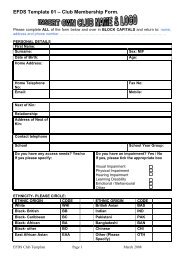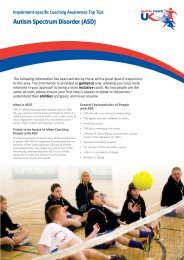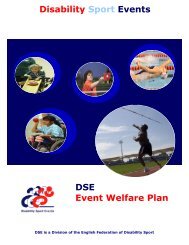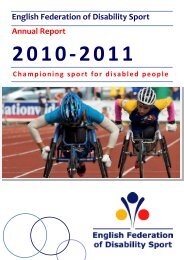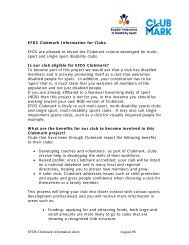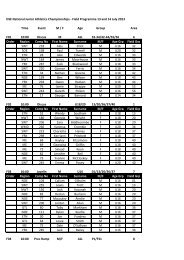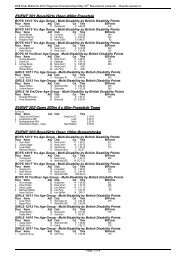OO213 - English Federation of Disability Sport
OO213 - English Federation of Disability Sport
OO213 - English Federation of Disability Sport
- No tags were found...
You also want an ePaper? Increase the reach of your titles
YUMPU automatically turns print PDFs into web optimized ePapers that Google loves.
FOREWORDIs there a child who does not dream <strong>of</strong> being counted and having her or his giftsand talents recognized? No. All children have hopes and dreams – including childrenwith disabilities. And all children deserve a fair chance to make their dreams real.This edition <strong>of</strong> The State <strong>of</strong> the World’s Children includes contributions byyoung people and parents who show that, when given that chance, children withdisabilities are more than capable <strong>of</strong> overcoming barriers to their inclusion, <strong>of</strong> taking their rightful placeas equal participants in society and <strong>of</strong> enriching the life <strong>of</strong> their communities.But for far too many children with disabilities, the opportunity to participate simply does not exist. Fartoo <strong>of</strong>ten, children with disabilities are among the last in line for resources and services, especiallywhere these are scarce to begin with. Far too regularly, they are the objects simply <strong>of</strong> pity or, worse,discrimination and abuse.The deprivations faced by children and adolescents with disabilities are violations <strong>of</strong> their rights and theprinciple <strong>of</strong> equity, at the heart <strong>of</strong> which lies a concern for the dignity and rights <strong>of</strong> all children – includingthe most vulnerable and marginalized members <strong>of</strong> society.As this report documents, the inclusion <strong>of</strong> children with disabilities in society is possible – but it requiresfirst a change <strong>of</strong> perception, a recognition that children with disabilities hold the same rights as others;that they can be agents <strong>of</strong> change and self-determination, not merely the beneficiaries <strong>of</strong> charity; thattheir voices must be heard and heeded in our policymaking and programmes.We contribute to their exclusion by failing to gather enough data to inform our decisions. When we failto count these children, we are failing to help them count for all they should in their societies.Fortunately, progress is being made – albeit unevenly. This report not only examines the challengesinvolved in ensuring that children with disabilities have the fair access to services that is their right. Italso explores initiatives that show promise in such areas as health, nutrition, education and emergencyprogramming – and in the data collection and analysis needed to improve policies and operations in allthese fields. Other chapters also discuss principles and approaches that can be adapted to advance thesechildren’s inclusion.Somewhere, a child is being told he cannot play because he cannot walk, or another that she cannotlearn because she cannot see. That boy deserves a chance to play. And we all benefit when that girl,and all children, can read, learn and contribute.The path forward will be challenging. But children do not accept unnecessary limits. Neither should we.Anthony LakeExecutive Director, UNICEFiii



